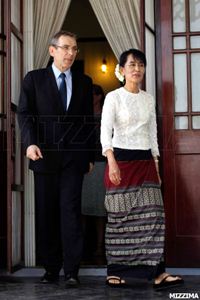In another example of the West reaching out to Burma, Aung San Suu Kyi will receive her first European delegation of lawmakers on Wednesday in Rangoon.

The European Parliament members said they welcomed recent positive developments in Burma, and they will invite Suu Kyi to address the European Parliament at a later date.
The delegation, led by Werner Langen of Germany will visit the newly elected Burmese Parliament to establish formal inter-parliamentary relations, meet with President Thein Sein, various ministers, representatives of civil society and members of the opposition.
The European Parliament is expected to vote on removing more E.U. sanctions against Burma sometime after the April 1 by-election, and also to consider implementing more humanitarian aid packages.
E.U. Development Commissioner Andris Piebalgs announced on February 13 the release of a US$ 200 million aid package to Burma, earmarked to benefit the health, education and infrastructure.
Piebalgs said President Thein Sein had noted in their meeting that in spite of major reforms in Burma, the EU sanctions were still in place. Piebalgs said he told the president that if the April 1 by-elections were free and fair, “then everyone would expect the easing of sanctions to continue.”
An end to E.U. sanctions would require the consensus of 27 EU countries, something that is “not such an easy thing to achieve,” Piebalgs said. Reports from Brussels said that on April 23, E.U. foreign ministers would explore the possibility of a substantial reduction of sanctions on Burma.
U.S. Secretary of State Hillary Clinton in early February on signed a partial waiver on restrictions that will allow the U.S. to support assessment missions and limited technical assistance by international financial institutions, such as the World Bank, the Asian Development Bank, and the International Monetary Fund, in Burma.
The assessments by international financial institutions will provide means to gain a greater understanding of Burma’s economic situation, particularly its severe poverty alleviation needs and capacity gaps.
The waiver was important in light of Burma’s need to create a banking and foreign exchange system in line with international standards and to reform its economic structure. Currently, it is working with the IMF, which is assessing its economic structure.
Burma’s relationship with the U.S. has evolved rapidly in the past several months to the point where the U.S. is now considering reinstating a modest aid program and not oppose moves by the International Monetary Fund and other key bodies to offer assistance to Burma as it attempts to emerge from two decades of isolation.
Burma’s hope is that the U.S. and other countries will lift economic sanctions, which were put in place after the former military regime attacked and killed hundreds of peaceful demonstrators in 1988 and began a systematic imprisonment of pro-democracy activists.
The Associated Press reported that during Clinton’s meeting with President Thein Sein he outlined his government's plans for reform in a 45-minute presentation in which he acknowledged that Burma lacked a recent tradition of democracy and openness. He asked for U.S. help in making the transition from military to full civilian rule.
At the time, Clinton was quoted as saying: “We’re not at the point yet where we can consider lifting sanctions. But any steps that the government takes will be carefully considered and will be matched.”


